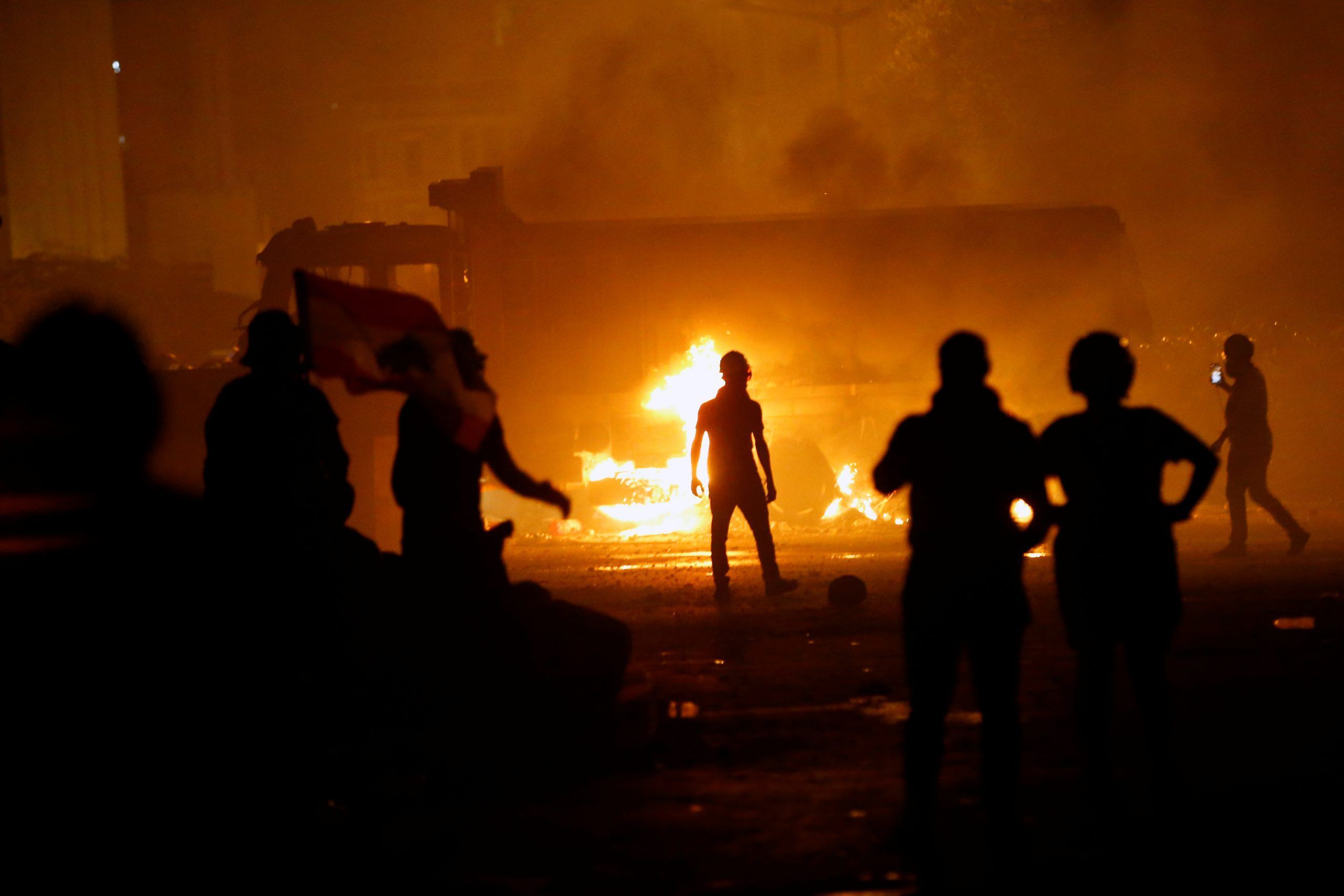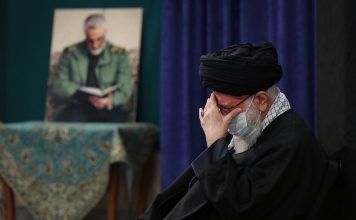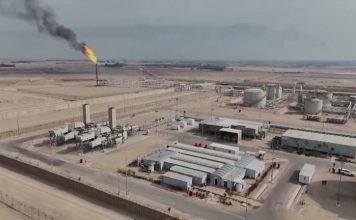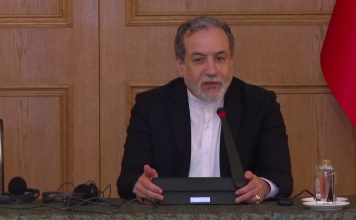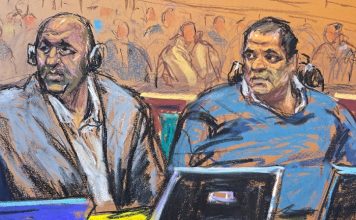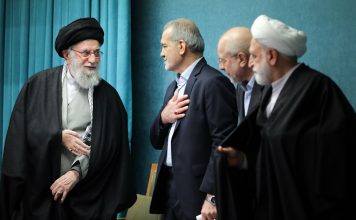By Tom Perry and Ellen Francis
BEIRUT, Aug 10 – Surveying Beirut’s shattered streets last week, in the aftermath of a massive explosion at the port that killed at least 158 people, French President Emmanuel Macron offered support to the people of Lebanon and delivered a stern message to the country’s ruling class.
What Lebanon needs, he said, is fundamental change.
“Strong political initiatives must be undertaken to fight corruption, to impose transparency and to carry out reforms put forward two years ago” at a conference of international donors in Paris, Macron said. Chief among these: “Overhaul the energy sector to counter the electricity shortages that affect the Lebanese people today.” It was a point Macron made repeatedly during his one-day visit.
On Monday, faced with growing public anger Prime Minister Hassan Diab announced his government would resign.
For years Lebanon has been blighted by power cuts. For many Lebanese, the state’s inability to deliver reliable electricity has become a metaphor for their country’s wider failings. The words, “The electricity went,” are among the first spoken by children here. Every day, lights, fridges and washing machines go off for hours when the supply from the state owned Electricite du Liban (EdL) stops. All the while, EdL is wracking up annual losses of up to $2 billion — around one third of Lebanon’s budget deficit.
Since the 2018 donors’ conference in Paris, the World Bank and Western and Arab states have stood ready with billions of dollars to help Lebanon sort out its finances and infrastructure, starting with electricity, on one condition: Beirut must enact reforms, including appointing a regulator, modernising the grid and eventually raising prices that haven’t changed since the 1990s. Over the last two years, the donors have watched in frustration as Lebanon’s economy imploded, reforms went nowhere and politicians argued over where to build a new power plant.
The underlying cause: the factional, sectarian politics of this country of six million that is home to many Muslim and Christian faiths.
[aesop_image img=”https://kayhanlife.com/wp-content/uploads/2020/08/2020-08-10T180649Z_1036694200_RC26BI99ZW3U_RTRMADP_3_LEBANON-SECURITY-BLAST-PROTESTS-scaled.jpg” panorama=”off” credit=”A member of Lebanese riot police fires a weapon during anti-government protests that have been ignited by a massive explosion in Beirut, Lebanon August 10, 2020. REUTERS/Thaier Al-Sudani” align=”center” lightbox=”on” captionsrc=”custom” captionposition=”left” revealfx=”off” overlay_revealfx=”off”]
The biggest Christian party in government, the Free Patriotic Movement (FPM), wants to build a power station in a northern Christian area, on a rocky strip of Mediterranean coast near a village called Selaata. It argues the plant is essential for Lebanon’s energy security. Other political parties and Lebanon’s international donors have raised concerns about the idea, however, not least because Selaata isn’t connected to the grid. Some suspect that behind the Free Patriotic Movement’s dedication to Selaata lie other motives, including its location in a mainly Christian part of the country. The FPM denies having a hidden agenda.
Documents seen by Reuters and interviews with more than a dozen officials with knowledge of the matter together reveal how the Free Patriotic Movement refused to give ground even as questions grew around the Selaata project’s viability and it became clear donors would not finance it as part of immediate steps to overhaul the power sector. These officials included international sources familiar with donor thinking, senior Lebanese politicians from across the spectrum, and civil society activists. The international sources declined to be named because of the sensitivity of the matter.
Reuters reporting also shows how this episode has frustrated donors, whose help Lebanon needs more than ever after last week’s explosion.
In the political gridlock over the plant, power cuts have worsened. Since last October, thousands of Lebanese have taken to the streets to protest against the country’s ruling class, with Lebanon’s broken power network top of their grievances. “We spent 10 days without any electricity at all,” said Samira al-Azar, a gym manager, who joined protests last month outside the state power firm’s Beirut headquarters, its yellow fence recently topped with barbed wire. “Switch off the lights at the rulers’ houses, light up the people’s houses,” chanted the crowd.
The failure to fix the electricity sector offers a glimpse into how Lebanon got into its worst crisis since the 15-year civil war that ended in 1990. Since late 2019, the financial system has unravelled under the weight of public debt, shutting savers out of their bank accounts, triggering a sovereign default, crashing the currency and driving up poverty.
Last week’s explosion has piled more misery onto the people, wrecking the commercial heart of Beirut and leaving around 250,000 people without homes. Power cuts have made cleanup attempts more difficult and dangerous in dark streets covered with broken glass and rubble, with the ever-present risk of falling debris. Officials have blamed the explosion on ammonium nitrate stored unsafely at the port. For many Lebanese, it was just the latest neglect by a sectarian elite that has for decades failed to provide the most basic services.
Jan Kubis, U.N. special coordinator for Lebanon, said that without reforming the electricity sector through “immediate, tangible and technically and economically sound measures, Lebanon cannot stop the deepening economic and social collapse (and) the Lebanese are doomed to increasing misery, that they cannot and will not tolerate.”
“The whole country knows it, but do its leaders?”
The government has pushed back against criticism that it has done nothing to fix the grid. After French Foreign Minister Jean-Yves Le Drian said, during a visit to Beirut in July, that steps to tackle the power sector were not encouraging, Prime Minister Diab retorted that Le Drian didn’t know enough about the “extent of the government’s reforms.” Energy Minister Raymond Ghajar, who was nominated by the Free Patriotic Movement, also defended the administration’s record. In a written response to Reuters, Ghajar said EdL’s financial position and service were improving. The main obstacles to reform, he went on, were “delays in administrative processes to get the necessary approvals.”
Asked why the Free Patriotic Movement is pressing for a power plant at Selaata, Free Patriotic Movement leader Gebran Bassil told Reuters: “My insistence is on 24-hour electricity…. Electricity (generation) must be distributed, for the integrity of the network, ask any expert. We need a number of locations.”
[aesop_image img=”https://kayhanlife.com/wp-content/uploads/2020/08/2020-08-10T172202Z_1075441757_RC24BI97F096_RTRMADP_3_LEBANON-SECURITY-BLAST-PROTESTS-scaled.jpg” panorama=”off” credit=”Demonstrators carry an injured man during anti-government protests that have been ignited by a massive explosion in Beirut, Lebanon, August 10, 2020. REUTERS/Hannah McKay TPX IMAGES OF THE DAY” align=”center” lightbox=”on” captionsrc=”custom” captionposition=”left” revealfx=”off” overlay_revealfx=”off”]
FRACTURED NATION
Lebanon has been governed by a sectarian power-sharing system since independence from France in 1943: The head of state must be a Maronite Christian, the prime minister a Sunni Muslim and the speaker of parliament a Shi’ite Muslim. While designed to ensure representation for a total of 18 religious communities, the system has helped inflict crisis after crisis on Lebanon, peaking in a civil war from 1975 to 1990.
The system’s critics say it has precluded the establishment of an effective, central state as former warlords and sectarian leaders are too often driven by regional agendas and self-interest. The main parties dominating Lebanon – Sunni, Shi’ite, Druze and Christian – have all carved out spheres of influence in the state which they have exploited to their own end, while blaming each other for the mess.
The most powerful is the heavily armed, Iran-backed Shi’ite Hezbollah movement, which the United States has labelled a terrorist organisation and deems a global threat. The group is today more deeply involved in state affairs than ever.
Centre stage in the row over electricity is the biggest Christian bloc, the Free Patriotic Movement, which was founded by President Michel Aoun and has defined itself as a protector of Christian rights. The party is led by Aoun’s son-in-law, Bassil, a former energy minister. It has held the energy brief for a decade, and with it oversight of state power firm EdL.
EdL’s problems run deep. They include a production gap of at least 1,500 Megawatts, a wasteful transmission grid, power theft, metre tampering and billing problems. EdL tariffs have not been increased since the 1990s, contributing to its hefty loss. Successive governments have vowed to fix this but never delivered. All sides blame others for blocking reform.
When EdL power goes down, households are forced to rely on private neighbourhood providers, at a high cost. Economists estimate that Lebanese pay some $1.5 billion or more a year to private suppliers, who distribute power to neighbourhoods via small generators and a spaghetti of cables often hung precariously from lampposts. The government last year sought to regulate these generator owners to reduce prices.
Omar Elhani, 38, who works at a florist shop in the northern city of Tripoli, needs a stable electricity supply for his 10-month-old son, who relies on a nebuliser to aid his breathing. These days their house only gets one to two hours of power a day from the grid and the local generator isn’t filling the gaps, so Elhani takes his son to friends’ homes in search of electricity. “The situation isn’t just bad. It’s really bad,” said the father of six, who earns little over a dollar a day.
A ROCKY SHORE
Besides local factories, the shore around Selaata is little touched compared to much of the Lebanese coast. The sleepy coastal road is bordered by verdant, rocky hills that rise sharply on one side and on the other by a rocky shoreline enjoyed by more intrepid beachgoers.
The World Bank Group flagged big concerns about Selaata as a location for a power plant as early as 2018, said an international source familiar with the matter. The costs, which include land acquisition by the state and sea reclamation, meant it was not a viable investment, the source said. The World Bank didn’t comment when asked by Reuters whether it had alerted the authorities to such long-held concerns.
When Diab, a Sunni Muslim under the sectarian system, took office in January this year – the previous government had resigned after street protests – he vowed to press on with long-delayed reforms, including measures to stamp out corruption and improve tax collection.
A World Bank emergency plan for the electricity sector set priorities for the government’s first 100 days in office. It called for starting a procurement process to build a power plant at Zahrani, a predominantly Shi’ite area in the south that is widely deemed to be a suitable site because it is already home to a power station. This should help keep the project costs down. The World Bank advised proceeding with plans for Selaata only after the government completed a study assessing its environmental and social impact.
As part of efforts to guide Lebanon, the World Bank commissioned French power company Electricite de France (EDF) to draw up a plan for the least costly options for generating power in the next decade. A draft of the EDF study, dated April and reviewed by Reuters, details a roadmap for meeting Lebanon’s needs – with the base scenario omitting generation capacity at Selaata. It foresees new capacity at Zahrani and Deir Ammar, a Sunni village in the north, as well as renewable energy projects. The international sources said Selaata was left out because it doesn’t make technical sense.
An EDF spokesman declined to comment on the report and said the company’s work was very preliminary. EDF had signed a consultancy agreement with the World Bank to create a master plan for the optimal energy mix in Lebanon and the ultimate decisions would be for the government to make, the spokesman said.
The World Bank told Reuters in a written response that it had recommended to Lebanon’s government “that any power plant should undergo a rigorous analysis of its environmental and social impacts” and should be picked on a least-cost basis. It said it was “unclear whether the first recommendation was fully implemented” and, if so, what the conclusions of the analysis were.
Energy Minister Ghajar said the “unfortunately” leaked draft report was still a work in progress with many different scenarios and that his ministry was “engaged with EDF to validate all the input data” for an updated version.
ANOTHER ROADBLOCK
On May 14, it finally looked like the government was moving forward with a plan to increase electricity generation. A cabinet decision explicitly spelt out where to site the first new power plant: It said it should be built at Zahrani, in the Shi’ite Muslim south. The majority of the cabinet was in favour, wanting the process moved along, political sources said.
Donors saw it as a move in the right direction, said a senior European diplomat and four other international sources familiar with donor thinking. “It was a possible, pragmatic step forward,” the diplomat said.
But the decision quickly hit another political roadblock.
The Free Patriotic Movement saw the plan as an attempt to shelve Selaata, political sources said. President Aoun demanded a review of the decision, noting that the government’s original plan to overhaul the sector involved three power stations, one of them at Selaata. In a cabinet session chaired by Aoun at the presidential palace two weeks later, the government confirmed its commitment to the original 2019 plan.
Around the same time in May, Ghajar, the energy minister, reminded donors in a presentation at a meeting at the government headquarters that Selaata remained a priority. The May 18 presentation, produced by the Ministry of Energy and Water and reviewed by Reuters, ranked Zahrani as the most suitable site but still dedicated a section to detailing exactly where in Selaata another power station should be located. It listed Selaata as the second most suitable site.
This did not go down well with donors, the international sources and other attendees said.
“It was really like thumbing the nose … like saying, ‘this is it and we want it’,” said Sibylle Rizk, director of public policies at Kulluna Irada, a Lebanese civil society group, some of whose members attended the meeting.
Ghajar said in a written response to Reuters the meeting was “an opportunity to inform the international community about the reality of things about Selaata instead of hearing fake news from here and there.” He said he had not noticed “anybody being surprised.”
“YOU NEVER KNOW WHAT MIGHT HAPPEN”
Selaata has even become an unlikely topic of conversation on prime-time TV. A shouting match erupted on a widely-watched talk show in July when a pro-Aoun pundit yelled that Christians deserved their own power station.
In Selaata, too, there has been controversy since the energy ministry decided last year to move the site a few kilometres along the coast to another parcel of land by a deep water port and local factories. The change has triggered local opposition in the mainly Christian village and has angered the municipal council, which says the proposed location is too close to homes and will cut off access to the port for local businesses.
Elias Taleb, a Free Patriotic Movement activist in Selaata, says he doesn’t want a power plant near his house, increasing the risk of pollution. Still, he believes it’s important to have one a few kilometres away in the Christian district, reflecting the type of factional thinking that endures in Lebanon, a country that was fractured into sectarian cantons during the civil war.
“You never know what might happen in the country… Somebody could turn off the power switch,” said Taleb, adding this was his personal view. “Why should the Sunnis get a plant in Deir Ammar and the Shi’ites in Zahrani, for example? Why shouldn’t there be one in the Christian area? Unfortunately, this is the way the country is.”
Asked by Reuters whether his party was promoting a plant at Selaata for sectarian reasons, Free Patriotic Movement leader Bassil replied: “When you want to talk, in Lebanon, about balanced development and the (geographical) distribution of projects, this cannot apply to one side and not the others. Why don’t you say this about those who want a plant in Zahrani? Why don’t you say this about those who want a plant in Deir Ammar? Only for Selaata?”
Defending its record in running the energy ministry, the Free Patriotic Movement blames parties that held the energy brief in the past and accuses others of standing in its way. Nada Boustani, energy minister for the Free Patriotic Movement in the previous government, says the party has no problem with building a plant at Zahrani as well as at Selaata. “But we’re saying commit to both because you need both if the final goal is 24-hour electricity.”
Donors acknowledge Lebanon’s right to choose where to put new generating capacity, but the country needs their money, and they are frustrated by the logjam. “Financing two power plants will be difficult, and they want us to finance a third without any credible explanation … Everyone told them no to Selaata,” said one of the international sources close to the issue.
Camille Abou Suleiman, a former labour minister allied with the second biggest Christian bloc in parliament, a rival to the Free Patriotic Movement, said the FPM’s intransigence was wasting valuable time. There was no need to totally rule out Selaata, he said, “but why hold up the whole process? Why not start with one power station – Zahrani – which is easier, and, if successful, proceed with others at what surely would be a cheaper cost and see what happens? It’s not the time to take a (Christian) community stand on this because we can’t afford it.”
For Daniel Younes, whose family owns a minimarket in a Beirut suburb, change can’t come soon enough. The worst power cuts he has ever seen are wiping out the family’s small profit, said Younes, who is nearly 60 and lived through Lebanon’s civil war. Not only are they forced to throw out spoiled dairy and frozen foods, but they have to pay more and more for the generator they use.
“The ice cream fridge, you come at night, there’s no electricity, it’s all a loss. And then you have to throw them out, and the yoghurt and cheese, in this heat,” he said. “This is the worst year, in everything. Sorry, but this is the most failing power grid in the world, the most failing ministry in history. We’ve never seen a year like this.”
(Additional reporting by Laila Bassam in Beirut and Benjamin Mallet and Benoit Van Overstraeten in Paris)
(Reporting by Tom Perry and Ellen Francis; editing by Janet McBride)

